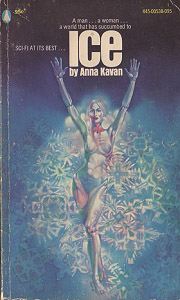
The looming apocalypse sparks war and civil unrest, in which the narrator and the Warden are often caught up, and to which the woman often falls victim, though she is always resurrected in time for the next iteration of her story. Great sheets of ice are enveloping the planet, which is swiftly becoming unlivable.

The backdrop to these partings and reunions is a planetary catastrophe. The novel is made up of a series of set-pieces, each with much the same structure: the narrator travels to meet the woman and her husband, is greeted with coldness from the latter and with revulsion bordering on hysteria by the former, and walks away in disgust, only to encounter them again elsewhere.

A similar alienating effect distances us from the novel's other characters-the woman (who is invariably referred to by the narrator as "the girl") with whom the narrator is obsessed and her husband, who is sometimes known as the Warden-whom we view only through the narrator's eyes, and who very seldom get to speak for themselves. His emotional reactions are mercurial and erratic, with almost no explanation of how they come about.

The narrator, who remains nameless throughout the novel, describes the present moment with almost no context-we learn very little about his past throughout the novel, and what we learn doesn't cohere into an image of the kind of person he is. Ice is told in a first person that is so tight as to be alienating. It achieves this goal in its very first sentence-"I was lost, it was already dusk, I had been driving for hours and was practically out of petrol"-and never lets up. Gaiman, in his talk, dismissed as all but impossible-to place the reader in the narrator's dream-like state, to convey not only illogical turns of event and senseless certainties, but the claustrophobic eeriness they produce. Its primary purpose seems to be to achieve the effect that Mr. It is a short novel (the Peter Owen reissue is less than 160 pages long), and quite repetitive. Or perhaps a more accurate term would be nightmarish. Gaiman's way of describing this effect) that have no relation to logic, narrative, or even metaphor and symbolism.Īnna Kavan's Ice unfolds with a similar dream-like logic. Nothing, he claimed, is quite so boring as actual dreams, in which the mind's processing centers, cut off from the senses and from higher reasoning, continue to churn and light up, producing certainties and causal leaps ("and suddenly it wasn't my high school gym teacher it was my mother" is my best recollection of Mr. The speaker was Neil Gaiman, and his topic was dreams.

About a year ago, I attended the guest of honor talk at ICon, the Israeli science fiction and fantasy convention.


 0 kommentar(er)
0 kommentar(er)
